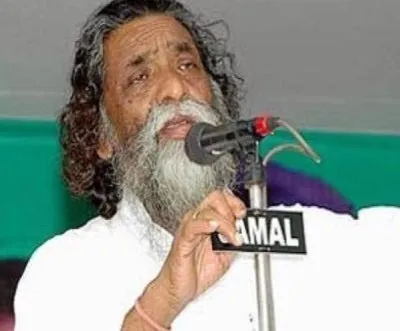Who Was Dishom Guruji, the Tribal Titan Who Shaped Jharkhand?

Synopsis
Key Takeaways
- Shibu Soren's life was marked by personal tragedy, which fueled his activism.
- He co-founded the Jharkhand Mukti Morcha to advocate for tribal rights.
- Soren's political career spanned over four decades, with multiple terms in both Lok Sabha and Rajya Sabha.
- His legacy is complex, encompassing both achievements and controversies.
- Hemant Soren continues his father's legacy as the current Chief Minister of Jharkhand.
New Delhi, Aug 4 (NationPress) Hailing from the tranquil village of Nemra in the Ramgarh district, which was once a part of undivided Bihar, Shibu Soren emerged from a backdrop of hardship. A member of the Santhal tribe, his formative years were overshadowed by tragedy, including the murder of his father by criminals allegedly employed by moneylenders. This pivotal event ignited his enduring fight against oppression.
By the age of 18, Soren took the initiative to organize resistance, establishing the Santhal Navyuvak Sangh. In 1972, he co-founded the Jharkhand Mukti Morcha (JMM) alongside A.K. Roy and Binod Bihari Mahato, a political movement that would become emblematic of tribal rights and land reclamation.
As the general secretary, Soren orchestrated protests aimed at reclaiming appropriated tribal lands, often administering what he termed “people’s justice” through unofficial courts.
His activism was not without its controversies. In 1975, he faced allegations related to a violent campaign against non-tribals in Chirudih, leading to multiple casualties. Although he was acquitted in 2008, unresolved charges from earlier incidents still linger.
Soren's political journey began with a setback during the 1977 Lok Sabha elections, but he made a comeback in 1980, winning the Dumka seat. Over the next 40 years, he represented in the Lok Sabha multiple times (1980-1984, 1989-1998, 2002-2019) and held positions in the Rajya Sabha, including his current term. His tenure was marked by both significant influence and controversy.
As the Union Coal Minister under Prime Minister Manmohan Singh during the UPA government, he resigned in 2004 due to the resurgence of the Chirudih case. After a brief period underground and a month in judicial custody, he returned to the Cabinet later that same year, which was viewed as a strategic alliance between Congress and JMM in the lead-up to Jharkhand’s Assembly elections.
In 2006, Soren's political career took a serious hit when he was convicted in the 1994 abduction and murder of his personal secretary, Shashi Nath Jha. The CBI suggested that Jha's awareness of dubious political transactions, including a contentious vote-saving arrangement during the Narasimha Rao government, was the motive for the crime. Despite this conviction casting a long shadow, Soren remained a powerful figure in Jharkhand politics. He served as Chief Minister of Jharkhand three times; briefly in 2005 (March 2-12), again from 2008 to 2009, and once more from 2009 to 2010.
For almost four decades, he led the JMM, transforming it into a formidable regional force and becoming its spiritual and political patriarch, affectionately known as Dishom Guruji.
Soren’s personal life mirrored the land he fought for. He was married to Roopi Kisku and had four children: Durga, Hemant, Basant, and Anjali.
Durga Soren served as an MLA from Jama (1995-2005) before his untimely passing. Hemant Soren, his political successor, currently serves as Chief Minister of Jharkhand, having held the position previously from 2013 to 2014. Basant Soren, the youngest son, is an MLA from Dumka and leads the youth wing of the JMM.
In June 2025, Shibu Soren was admitted to Sir Ganga Ram Hospital in Delhi, contending with kidney issues and the aftereffects of a stroke. Despite being placed on life support, his health continued to decline.
On August 4, at 8:56 a.m., he was pronounced dead by Dr. A.K. Bhalla, head of nephrology at the hospital.
His passing signifies the end of an era.
In a deeply emotional tribute, Hemant Soren expressed: “Respected Dishom Guruji has left us all... I have become 'shunya' (zero) today.”
Shibu Soren’s legacy is multifaceted—intertwined with resistance, reform, controversy, and unwavering conviction. He leaves behind a political lineage, a tribal movement, and a state profoundly influenced by his lifelong struggle.










